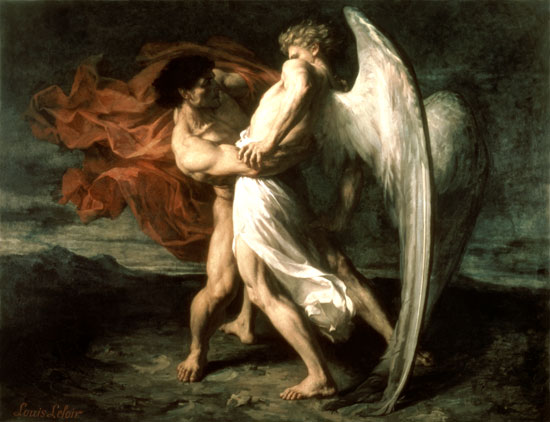Spiritual Sunday
Like many people, I’ve always been fascinated by the story of Jacob wrestling with the angel, today’s Old Testament reading. Rainer Maria Rilke has a powerful take on the episode in his poem “The Man Watching.”
First, here’s the story:
The same night Jacob got up and took his two wives, his two maids, and his eleven children, and crossed the ford of the Jabbok. He took them and sent them across the stream, and likewise everything that he had. Jacob was left alone; and a man wrestled with him until daybreak. When the man saw that he did not prevail against Jacob, he struck him on the hip socket; and Jacob’s hip was put out of joint as he wrestled with him. Then he said, “Let me go, for the day is breaking.” But Jacob said, “I will not let you go, unless you bless me.” So he said to him, “What is your name?” And he said, “Jacob.” Then the man said, “You shall no longer be called Jacob, but Israel, for you have striven with God and with humans, and have prevailed.” Then Jacob asked him, “Please tell me your name.” But he said, “Why is it that you ask my name?” And there he blessed him. So Jacob called the place Peniel, saying, “For I have seen God face to face, and yet my life is preserved.” The sun rose upon him as he passed Penuel, limping because of his hip. (Genesis 32:22-31)
In Rilke’s poem I pick up echoes of both Coleridge’s “Dejection: An Ode” and Shelley’s “Ode to the West Wind.” The poet appears to have been wrestling with depression but, after the brute force of that internal storm, he finds a certain peace. The new quiet is like “a line in the psalm book,” and he wonders why he chose to worry over tiny matters.
Worry comes from a need to triumph, to feel dominant. However, when he opens himself to forces greater than himself and allows them to remake him as the angel remakes Jacob, he becomes strong and does not “need names.”
As the poet talks of allowing himself to be dominated, I think of a passage from Shelley’s poem, with the west wind functioning as the creative force:
Oh, lift me as a wave, a leaf, a cloud!
I fall upon the thorns of life! I bleed!
A heavy weight of hours has chain’d and bow’d
One too like thee: tameless, and swift, and proud.
Both Shelley and Coleridge compare themselves to Aeolian lutes (wind harps), being played upon by the cosmos, and Rilke plays with the idea as well. In his case, however, the strings are Jacob’s sinews:
when the wrestler’s sinews
grew long like metal strings,
he felt them under his fingers
like chords of deep music.
His final realization is that he grows “by being defeated, decisively,/by constantly greater beings.”
Here’s the poem:
The Man Watching
By Rainer Maria Rilke
I can tell by the way the trees beat, after
so many dull days, on my worried windowpanes
that a storm is coming,
and I hear the far-off fields say things
I can’t bear without a friend,
I can’t love without a sister.
The storm, the shifter of shapes, drives on
across the woods and across time,
and the world looks as if it had no age:
the landscape, like a line in the psalm book,
is seriousness and weight and eternity.
What we choose to fight is so tiny!
What fights with us is so great.
If only we would let ourselves be dominated
as things do by some immense storm,
we would become strong too, and not need names.
When we win it’s with small things,
and the triumph itself makes us small.
What is extraordinary and eternal
does not want to be bent by us.
I mean the Angel who appeared
to the wrestler of the Old Testament:
when the wrestler’s sinews
grew long like metal strings,
he felt them under his fingers
like chords of deep music.
Whoever was beaten by this Angel
(who often simply declined the fight)
went away proud and strengthened
and great from that harsh hand,
that kneaded him as if to change his shape.
Winning does not tempt that man.
This is how he grows: by being defeated, decisively,
by constantly greater beings.
